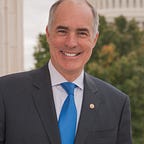This World Mental Health Day, we can’t forget about our children
Much of our discussion of health care too often bypasses an important issue: mental health among children. One in five children in the United States show signs of living with a mental health condition. That means that in a class of 25 students, it’s likely that five of them will deal with depression, anxiety, substance use disorders or other adverse childhood experiences that make learning a serious challenge.
The COVID-19 pandemic has only exacerbated stressors and trauma for vulnerable families, children and adolescents in our Nation and all over the world, triggering mental health issues that may follow into adulthood. As we recognize World Mental Health Day during this unprecedented health and economic crisis, I wrote to urge USAID to prioritize Mental Health and Psychosocial Support (MHPSS) for children in adversity and their caregivers affected by the COVID-19 pandemic.
However, this is not a new problem. Prior to COVID-19, one billion children around the world experienced physical, sexual or emotional abuse, according to USAID. Up to 20 percent of adolescents currently experience diagnosable mental health conditions, and children with disabilities experience the highest levels of abuse and neglect. Accordingly, MHPSS interventions for children, adolescents and their families during the COVID-19 pandemic and beyond must be mainstreamed across all sectors and, through the involvement of affected communities, integrated into existing community structures, national systems and coordination mechanisms in order to secure access to services and reduce potential stigma and discrimination for all those seeking care and support, regardless of age, gender, disability or diversity. Continued investment in community-based MHPSS and integration of MHPSS across sectors, including nutrition, global health, education and child protection programming are critical to the futures of our children.
Every child is born with a light inside them and all of us have an obligation to ensure that light can shine brightly. We have to make sure we are there for every child, especially when it comes to mental health care.
Full letter to USAID: HERE
